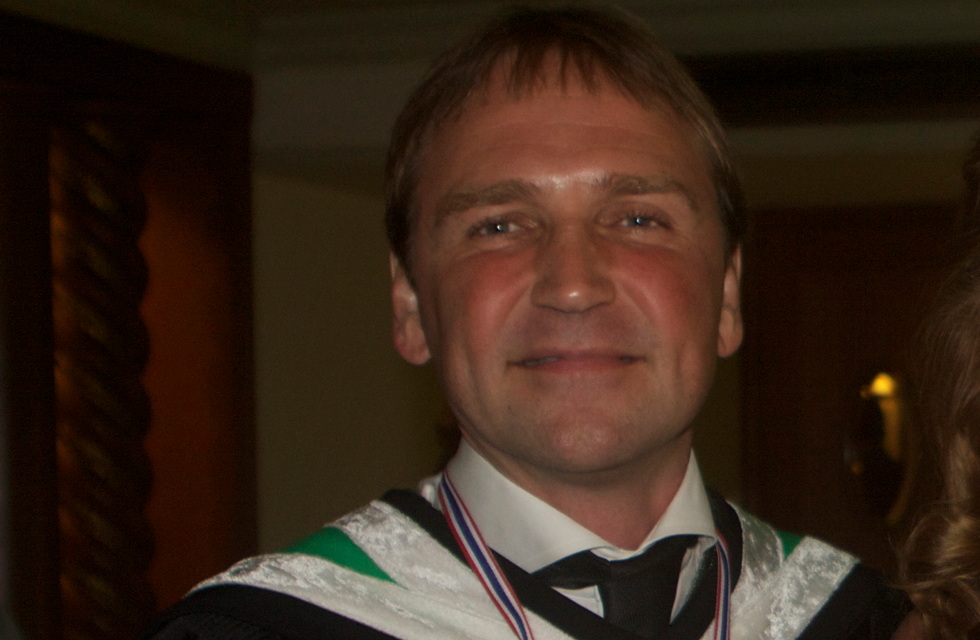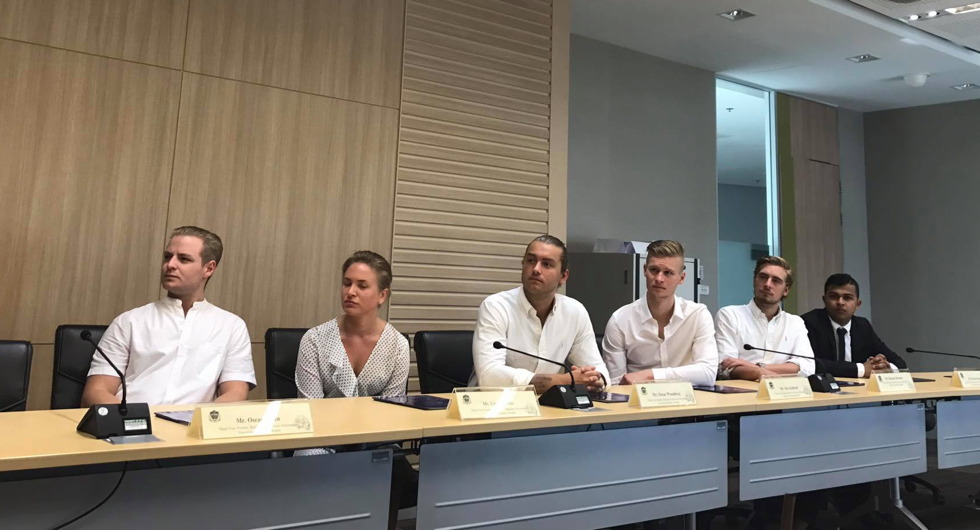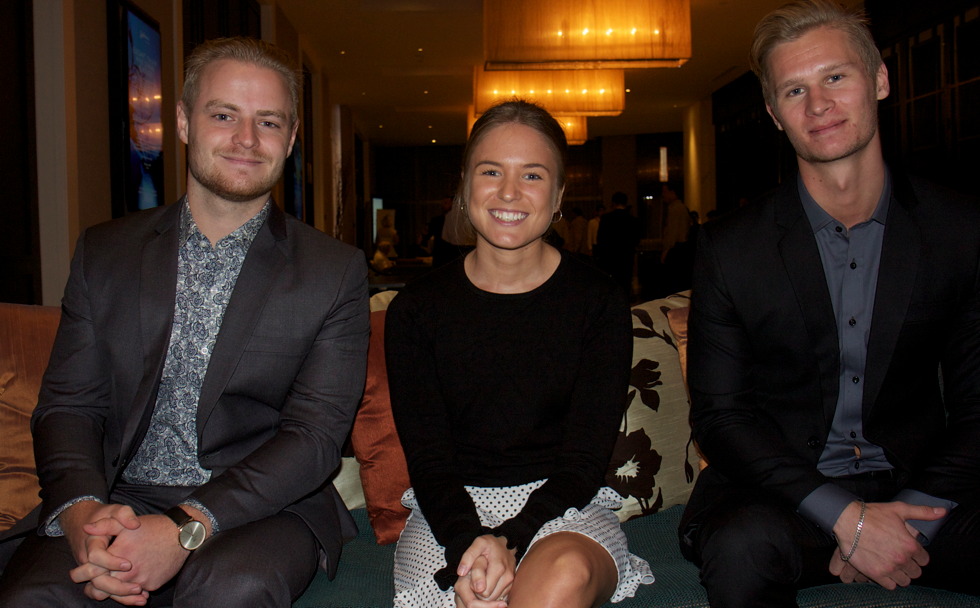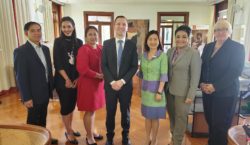Swedish expat in Thailand, Mr Håkan Alm has refocused and returned to the academic world. From IT service provider for the international businesses community and beyond, primarily in Bangkok, for many years including the role as Scandinavian Airlines Systems’ go-to guy in Asia when it came to any IT needs and troubleshooting, he suddenly decided on a game-changer in his career, which today seems to have been forward-thinking.

Because disruption and digitalisation are now changing all sectors significantly, turning old businesses upside down and prompting a strong need to cater for both IT skills and business knowledge.
IT was in 2007 that Håkan took the decision to, albeit late, return to the academic world to further his studies, with the aim of eventually becoming a professor.
“I first registered at Linköping University and then defended my thesis at AIT, Asian Institute of Technology, in Bangkok. Around 2008 I started working part-time as teacher. And since 2013 I’m full time lecturer at University of Borås in Sweden and also responsible for a programme called Business Informatics,” tells Håkan and adds: “Sometimes I name it as Business and IT programme, where they study 50/50 IT and economics courses the first two years and then choose for the third what they want to focus more on, leading to either a Bachelor in Computer Science or a Bachelor in Business.
“I’m pretty senior in the IT business and consultancy world, and relatively junior in the academic world, as I got my Doctor’s Degree as late as in 2014.”

Aside from teaching and some smaller administrative assignments Doctor Alm is today part of a research group called SIIR, Swedish Institute for Innovative Retailing. “We are among other things looking at consumer behaviour, and various forms of technology use to come up with more interesting offline and online shopping experiences. We don’t believe that bricks and mortar shopping will disappear, but that they must develop and become more interesting to survive as that segment evolve. When taking a purchase decision today one does not just enter a shop and buy something. One probably has done some online research first, maybe used a price comparison tool, maybe even taken a photo of the item and published it on social media too see what the friends think. And then, if the feedback is good, one might buy it.”
“Another part is the mobile payment systems and using big data; all companies have enormous amounts of data, but most businesses, including even the largest ones that should be clever, do not really know what to do with all the data. And what we do is to build ways and algorithms to manage data in an effective way.”
Håkan is now able to combine his experience from running a business with academic research – and coming up with commercially viable solutions. And for him this is only natural: “I have a background working as an IT and business consultant for many years and for me when I entered the academic world, I was an industrial doctor candidate, meaning that much of my financing came from my business. And, also now my research is very close to the business world. But one part is of course to publish at scientific conferences and in journals etc. That is needed to, step by step, become a full professor.

While Håkan is now employed by a university in Sweden it does not mean he has left Asia behind.
During the autumn 2017 semester the very first batch of exchange students from his programme has studied in Bangkok and a collaboration with universities in Indonesia kicks off next January.
“We have six students studying for one term–most of it business, and mixed with IT–at PIM, Panyapiwat Institute of Management.”
PIM is Thailand’s number one corporate university, under the flagship of CP ALL PCL, with the objective of transferring the knowledge of the business community to students, Interestingly, given what Håkan is spearheading within Sweden’s university world, PIM aims to fill the divide between conventional education and the demands of corporations. PIM sees that in to produce job-ready graduates for today’s disruptive world the main approach must be work-based learning.
“PIM are very close to the industry so they are very good for internships.” comments the Swede.
Meanwhile in Indonesia Borås University has had partnerships, within psychology, with Gunadarma University as well as Gadjah Mada University in Yogjakarta. Now, Håkan and a colleague has revamped this, initially with support from Linneaus Palme scholarships to seek connections and further collaboration opportunities.
“We applied for a larger financing which would mean sending a number of teachers and students to Indonesia and they would do the opposite. And now it focuses on IT even though psychology is still part of it. This means that this financing is for a three-year-period where I’m one of the teachers going to Indonesia to lecture with Indonesian students. And I have a counterpart that will come to Borås and lecture there. And then we’ll have a number of students going in both directions, for exchange studies. So, this will be the first students go there in January.”
“We are also looking at possibly doing research in Indonesia and at PIM Bangkok.”
Commenting further about mobile payment systems and more Hakan says: “We’ve been walking around with plastic cards for forty years and the idea is that one must not do that in the future.
“What I am looking at is going further than mobile payment and digital wallets, in a nutshell.”
“What Sweden is doing now is for example is launching its own electronic currency. Sweden’s national bank was the first in the world to start using bills as currency and might now become the first state to have an electronic currency. Sweden is also expected to be the first cashless country in the world, as early as 2023.”
“And exactly what will happen, with virtual currencies , etc. I am also not a fortune teller! But this is exceptionally interesting, and when things can settle down a bit more and get going and the worst Klondike has passed over and you end up with the serious players left – like what happened in the IT crash at the end of 1990s; there was nothing wrong with the Internet, but quite a lot was wrong with those copying and pasting back then. And one believed back then that sound ways of doing business no longer applied. But it turned out that yes it did; it just it took a bit longer.”
“Something else I am looking at with fascination is leapfrogging. Take a country like Thailand where most people–young, old, rich and poor, highly educated or lacking skills –they all have smart phones. Most of them have never used a PC, but started their internet experience with smart phones, as their first mobiles,” he adds.

“And that kind of leapfrogging becomes extremely interesting and relevant, with people from the countryside in for instance Indonesia suddenly doing pretty cool things that those of us with a quite long IT experience could not ourselves do only one or two years back.”
Håkan takes a strong interest in comparative studies, looking at how things work in different parts of world, such as concerning his “baby” payment solutions “There are no good such solutions today that works well across borders, not even within the EU. Also. besides, plastic cards, few solutions work both online and offline.”
There are fresh players on the market now that offer innovative financial solutions – which also brings us back to the topic of education: “When Collector Bank employs people today they hire more within IT skills than business. They like my students who graduates with a solid IT and Business background. Also at traditional large bank corporations look for that today in people’s profile, so it’s no longer obvious, that if coming from the Business School that you are employable at a bank.”

University of Borås used to have an institution for trade and IT. “But after re-structuring to a model with faculties IT and economics ended up at different faculties. However, in the university programme I am running you have one foot on each side of the fence in these two faculties. Personally I think this new separation was unfortunate. Economy and IT will always go hand in hand for me so it was no coincidence I was appointed as responsible for the IT and Business programme. We have an ongoing dialogue with the business world and they are exceptionally enthusiastic for this kind of education,” says Håkan.
“And what is also incredibly surprising is how few universities in Sweden actually have this type of programme. Business Engineering is pretty common, while the IT and Business combination isn’t. Traditionally in the academic world we work in silos. This topics and discipline thinking is still there, the traditionalism and protectionism. We must change that. I cannot speak IT without talking Business at the same time with what I am doing. I will still get objections, but today’s world works like this: A bank cannot employ Business people who lack IT knowledge!”
“It is interesting that society places so much importance on education while the academic world still has evolved very little. There are two things I am fighting for: 1) internationalisation. As we live in a global world the universities cannot operate only locally 2) industrial connection versus the disciplinal protectionism that is limiting the quality of education.”
See also: Bangkok exchange students from Borås University, Sweden



